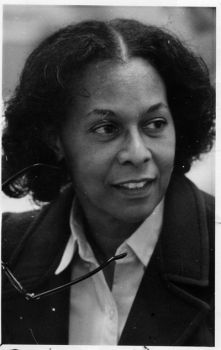
Pioneering journalist and civil rights activist Almena Lomax was a leader in African American journalism and founded a black weekly newspaper in Los Angeles. She was the first black person to work on the city desk of the San Francisco Chronicle.
Hallie Almena Davis was born on July 23, 1915, in Galveston, Texas. Her father was postal deliveryman and her mother was a full-time seamstress. In 1917 the Davis family relocated to Chicago briefly before permanently settling in California in the early 1920s.
In 1933, Davis graduated from Jordan High School in Los Angeles, California and soon afterwards enrolled in Los Angeles City College where she majored in journalism. Davis graduated in 1938 and was hired by editor Charlotta Bass to work for the African American weekly The California Eagle. Davis also worked at a local Los Angeles radio station, where she ran a news/interview broadcast program two times a week.
In 1941, Davis acquired a loan from her future father-in-law, Lucius W. Lomax Sr., enabling her to start her own newspaper, The Los Angeles Tribune. Soon afterward she wed Lucius W. Lomax Jr., and the couple had six children before the marriage ended in 1960.
Throughout the 1940s and into the 1950s, the Los Angeles Tribune attained great popularity and eventually rivaled the much older California Eagle and the Los Angeles Sentinel, the other black newspapers in the city. Beginning first as a small weekly newsletter, by the end of the decade the Tribune’s weekly circulation reached around 25,000 subscriptions. Occasionally Lomax wrote for other newspapers as well. In 1946 she wrote a controversial guest editorial challenging the myth of African American male sexual prowess. The piece won her first place in the Wendell L. Willkie Awards for Negro Journalism.
By the 1950s, Lomax became more directly involved in politics and civil rights activism. In 1952 she was a delegate to the Democratic National Convention. In 1956, Lomax traveled to Montgomery, Alabama to write about the ongoing Montgomery Bus Boycott and the emerging Civil Rights Movement. Later in the decade she led protests against an array of Hollywood motion pictures that she and others felt promoted damaging representations of African Americans. Two of those films were Porgy and Bess and Imitation of Life.
The Los Angeles Tribune ended its publication in 1960 when Lomax divorced her husband and moved with her six children to Tuskegee, Alabama. From Tuskegee she continued to write articles for national magazines such as The Nation. In 1969 she returned to California and wrote for the San Francisco Chronicle and later its competitor the San Francisco Examiner. Lomax continued to write on political and social events into the 1990s. Her career ended when she developed poor eyesight.
Her daughter Melanie went on to become the president of the Los Angeles Police Commission and a prominent civil rights attorney before her death in 2006. Another daughter Michele was a film critic at the San Francisco Examiner before her death in 1987. Her son Michael is national president and CEO of the United Negro College Fund and a son Mark is a Los Angeles attorney.
Hallie Almena Davis Lomax passed away on March 25, 2011, in Pasadena, California. She was 95.

